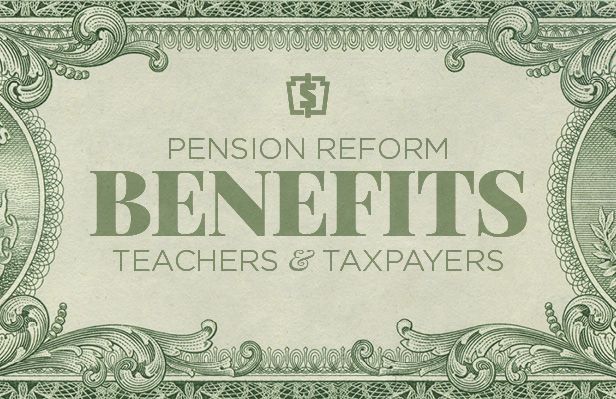Commentary

Pension Reform Benefits Teachers & Taxpayers
Note: This commentary has appeared in the Scranton Times-Tribune and the York Daily Record among other publications.
Standard & Poor’s recently issued a stern warning that they would lower Pennsylvania’s bond rating—making it more expensive for the state to borrow money—unless they “adopt meaningful pension reform.” This worries Steve Calabro, a public school teacher and participant in the public pension system, who says, “Without a fix, this is going to decline rather quickly and something drastic is going to happen.”
Calabro is right: Today, Pennsylvania has more than $50 billion in public pension debt. Who’s liable? Taxpayers, who will have to pay off this debt with an estimated $7.5 billion additional contribution each year for 30 years. That’s almost $1,550 more per household!
State pension costs will more than double over the next three years, crowding out funding for education, transportation, and other programs. School districts, which chip in separately for pension costs, face similar increases equal to the salaries of 33,000 teachers—nearly one of every three teachers.
Calabro says action is needed now: “Something has to be done. The sooner we get through all the rhetoric and all the talking points and actually do something, the better off we and our kids will be.”
A new report released by the Commonwealth Foundation offers sound advice on a path forward. Based on the experiences of other states and the private sector the report advises moving to a defined contribution plan, similar to a 401(k), for new workers. This option offers benefits for taxpayers, local governments, and public employees alike.
Real world examples, like Michigan and Utah, show that this type of pension reform will keep more money in the pockets of hard working taxpayers.
Defined contribution plans also make costs more predictable. There are no “pension spikes,” like the one facing taxpayers today, and school officials won’t be forced to figure out property tax increases year after year.
Defined contribution plans are also debt free. Employers (meaning the state or school districts) contribute a set percentage of pay into a worker’s account each year. These plans are always “fully-funded”—they can’t pile up $50 billion in debt or threaten to drive governments, like Detroit, into bankruptcy.
Pension reform benefits taxpayers and governments, but it also helps employees, including teachers like Steve.
Plans like the 401(k) don’t lose benefits when a worker shifts jobs or moves to another state. Given the average worker will have ten jobs in his or her career, this type of portability and convenience are vital in today’s workplace.
Defined contribution plans are also owned by the worker rather than the government, empowering employees with more control over their own retirements. And the latest research shows that 401(k) plans offer workers higher investment returns over their working lifetimes.
But despite the benefits for workers, government union CEOs, like the Pennsylvania State Education Association’s (PSEA) Michael Crossey, continue to oppose reform. Their solution: Do nothing.
The PSEA sent over-the-top emails to teachers saying a new pension reform proposal is “a new attack on YOUR retirement security,” and claiming it unfairly targets women, playing off absurd “war on women” demagoguery. Calabro called it a “drummed-up attack to take away from the actual facts of the matter that PSEA would like the status quo.”
It is undeniable that the PSEA’s lobbying apparatus is one of the largest, and most effective, in Harrisburg. Last year alone, the union spent $3.8 million of union members’ dues on political activity and lobbying. That amount is set to nearly double. The union told members in its newsletter that 12 percent of this year’s dues—more than $7 million—could go to politics.
This effort includes the most disingenuous scare tactics. In a flier for public school retirees, the PSEA claims that proposed reforms jeopardize retirees’ pensions—though not a single bill would touch retirees, nor has any even claimed doing so would be legal. Bill Frye, a retired teacher from Westmoreland County says, “The message they keep sending is a bunch of double-talk.”
Shockingly, the public pays to collect the political money the union uses to lobby against pension reform taxpayers need.
Pennsylvania lawmakers need to shake off union leaders’ pressure and listen to the warnings of financial experts and the concerns of teachers like Steve Calabro. “I don’t think it’s really fair to be asking future generations to pay our allowance just because we don’t want to act upon the reform now,” he says. “That’s just not responsible to our children and their children.”
# # #
Nathan A. Benefield is vice president of policy analysis for the Commonwealth Foundation (CommonwealthFoundation.org), Pennsylvania’s free market think tank.